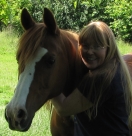The year is 2040. I am living on this wonderful horse farm today, thanks to Grandmother Becky. Back in 2010, she made the choice to adopt the principles of tri-nested sphere sustainability. She integrated the practices into all areas of her life. Others realized the wisdom of these living choices, and they worked together to find equine-related product and service providers who met the guidelines of long-term sustainability in the three spheres of environmental, social and economic factors. It seems odd now to me that there was any other way to live, but back then, she and the others were pioneers. Her son, my father, continued this legacy.
Equine enterprises were among the early leaders in sustainability in the world. Each sustainable equine place developed practices that worked best for their situation. Yet all are based on similar principles, which are just as valid today as they were years ago. And, of course, these principles also apply beyond the equine world.
The deepest foundation principle of all is love. Loving kindness, respect, compassion, consideration, a sense of oneness. Arising from this foundation, every thought and action is infused with a powerful energy. Another related principle is wholeness. Whole system thinking; everything is connected. Awareness of the effects of choices on the whole, not merely on the direct line of action. “Relatedness is the organizing principle of the universe.” Concepts such as interdependence, integration, cooperation, collaboration and dialogue live in whole systems design.
Whole system thinking includes life-cycle thinking. Everything in the natural world is part of a cycle. Day and night, moon phases, seasons, birth and death, carbon and other nutrients, water, tides, and so on. Grandmother’s generation saw the transformation from the unintelligent “take-make-waste” practices, which had become the norm, to the “life-cycle design” systems for production of goods. Today’s common phrases, such as “cradle to cradle” and “waste equals food”, were born back then.
Principles based on the wisdom of the natural world began to inform all aspects of living. Resources started to be used only at the same rate as they were renewed. The impact of harvesting or mining was studied on a comprehensive level before any action was taken. Biodiversity became recognized, appreciated and encouraged. The sun became the basis for supplying most energy needs. As the toxic effects of many man-made chemicals became unmistakable and deadly, people reacted swiftly to block their production and to replace them with naturally-occurring alternatives or found ways to live without them. Needless to say, the earth and our equines also benefitted from this change.
Though by Grandmother’s time overt slavery was illegal and considered immoral, there was a hidden “slavery” which no one thought much about. These practices included underpaying workers directly and also indirectly by doing business with companies that underpaid their employees. These greed-based practices also included questionable, and outright cruel, treatment of horses and other equines, in the name of profit for the owners. I am happy to say that, today, equines are considered beings of value in their own right. While some still help generate income, they are viewed as more as companions than commodities. People and equines learn from each other. All equines live fulfilling lives, and are treated with dignity from birth through death. Unwanted horses are, thankfully, a disgrace of the past.
People have learned to embrace their own innate value and take responsibility for their own lives. We access an internal source of joy and peace, and focus more on the content of our lives rather than the form our lives take. Who a person is inside outshines his or her appearance or possessions. We reach out to each other, sharing a sense of belonging with family, community, and the wider world. Service, not authority, has become the highest form of leadership.
The economy is now based on sound principles, which include full-cycle factors and the environmental costs of all products and activities. We value a culture and economy that is designed to allow everyone to meet their basic needs. The vision and practices of a business are more highly regarded than its financial bottom line. A business person’s ability to create meaningful employment for others, or guide young entrepreneurs, is honored far above any personal or business net worth. A culture of giving and sharing has replaced the culture of taking and hoarding. A sense of abundance permeates life.
When principles of design and creation are based on consideration for all life on our planet, the products and services work so well that there is little need for government regulation. Competition serves only to encourage improvement and innovation. Knowledge is shared and imagination is supported.
All these ways of being and acting were modeled by the past generations, and gradually became the common practices of today. I live in gratitude for the deep thinking and conviction of my predecessors. I am committed to continuing to provide a profound and awesome future for my descendants and their animal partners, generation after generation.
Quotations:
“Relatedness…” Joseph Jaworski, Synchronicity, The Inner Path to Leadership
“Cradle to cradle” Originally, Walter Stahel; McDonough and Baungart Cradle to Cradle
“Waste equals food” McDonough and Baungart Cradle to Cradle
